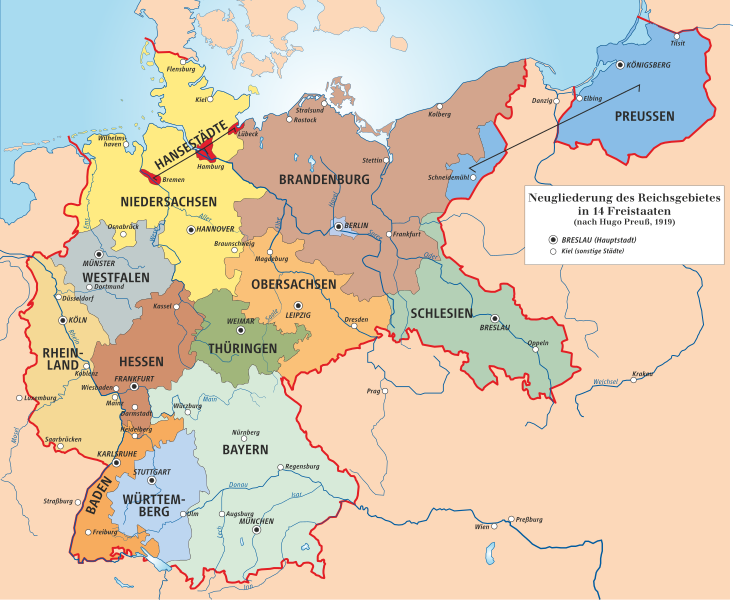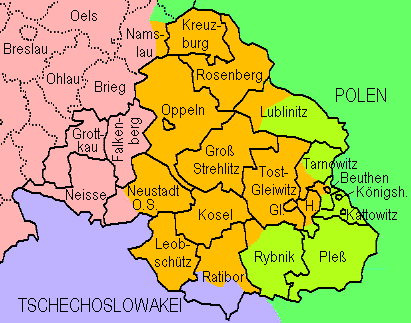Article 88[edit]
In the portion of Upper Silesia included within the boundaries described below, the inhabitants will be called upon to indicate by a vote whether they wish to be attached to Germany or to Poland:
starting from the northern point of the salient of the old province of
Austrian Silesia situated about 8 kilometres east of
Neustadt, the former frontier between Germany and Austria to its junction with the boundary between the
Kreise of
Leobschütz and
Ratibor;
thence in a northerly direction to a point about 2 kilometres south-east of
Katscher: the boundary between the
Kreise of Leobschütz and Ratibor;
thence in a south-easterly direction to a point on the course of the
Oder immediately south of the Ratibor–
Oderberg railway: a line to be fixed on the ground passing south of
Kranowitz;
thence the old boundary between Germany and Austria, then the old boundary between Germany and Russia to its junction with the administrative boundary between
Posnania and Upper Silesia;
thence this administrative boundary to its junction with the administrative boundary between Upper and
Middle Silesia;
thence westwards to the point where the administrative boundary turns in an acute angle to the south-east about 3 kilometres north-west of
Simmenau: the boundary between Upper and Middle Silesia;
then in a westerly direction to a point to be fixed on the ground about 2 kilometres east of
Lorzendorf: a line to be fixed on the ground passing north of
Klein Hennersdorf;
thence southwards to the point where the boundary between Upper and Middle Silesia cuts the
Städtel–
Karlsruhe road: a line to be fixed on the ground passing west of
Hennersdorf,
Polkowitz,
Noldau,
Steinersdorf, and
Dammer, and east of
Strehlitz,
Nassadel,
Eckersdorf,
Schwirz, and Städtel;
thence the boundary between Upper and Middle Silesia to its junction with the eastern boundary of the
Kreis of
Falkenberg;
then the eastern boundary of the
Kreis of Falkenberg to the point of the salient which is 3 kilometres east of
Puschine;
thence to the northern point of the salient of the old province of Austrian Silesia situated about 8 kilometres east of Neustadt: a line to be fixed on the ground passing east of
Zülz.
The regime under which this plebiscite will be taken and given effect to is laid down in the Annex hereto.
The Polish and German Governments hereby respectively bind themselves to conduct no prosecutions on any part of their territory and to take no exceptional proceedings for any political action performed in Upper Silesia during the period of the regime laid down in the Annex hereto and up to the settlement of the final status of the country.
Germany hereby renounces in favour of Poland all rights and title over the portion of Upper Silesia Iying beyond the frontier line fixed by the Principal Allied and Associated Powers as the result of the plebiscite.
Annex[edit]
1. Within fifteen days from the coming into force of the present Treaty the German troops and such officials as may be designated by the Commission set up under the provisions of paragraph 2 shall evacuate the plebiscite area. Up to the moment of the completion of the evacuation they shall refrain from any form of requisitioning in money or in kind and from all acts likely to prejudice the material interests of the country.
Within the same period the Workmen's and Soldiers' Councils which have been constituted in this area shall be dissolved. Members of such Councils who are natives of another region and are exercising their functions at the date of the coming into force of the present Treaty, or who have gone out of office since 1 March 1919, shall be evacuated.
All military and semi-military unions formed in the said area by inhabitants of the district shall be immediately disbanded. All members of such military organisations who are not domiciled in the said area shall be required to leave it.
2. The plebiscite area shall be immediately placed under the authority of an International Commission of four members to be designated by the following Powers: the United States of America, France, the British Empire, and Italy. It shall be occupied by troops belonging to the Allied and Associated Powers, and the German Government undertakes to give facilities for the transference of these troops to Upper Silesia.
3. The Commission shall enjoy all the powers exercised by the German or the Prussian Government, except those of legislation or taxation. It shall also be substituted for the Government of the province and the
Regierungsbezirk.
It shall be within the competence of the Commission to interpret the powers hereby conferred upon it and to determine to what extent it shall exercise them, and to what extent they shall be left in the hands of the existing authorities.
Changes in the existing laws and the existing taxation shall only be brought into force with the consent of the Commission.
The Commission will maintain order with the help of the troops which will be at its disposal, and, to the extent which it may deem necessary, by means of gendarmerie recruited among the inhabitants of the country.
The Commission shall provide immediately for the replacement of the evacuated German officials and, if occasion arises, shall itself order the evacuation of such authorities and proceed to the replacement of such local authorities as may be required.
It shall take all steps which it thinks proper to ensure the freedom, fairness, and secrecy of the vote. In particular, it shall have the right to order the expulsion of any person who may in any way have attempted to distort the result of the plebiscite by methods of corruption or intimidation.
The Commission shall have full power to settle all questions arising from the execution of the present clauses. It shall be assisted by technical advisers chosen by it from among the local population.
The decisions of the Commission shall be taken by a majority vote.
4. The vote shall take place at such date as may be determined by the Principal Allied and Associated Powers, but not sooner than six months or later than eighteen months after the establishment of the Commission in the area.
The right to vote shall be given to all persons without distinction of sex who:
(a) Have completed their twentieth year on the 1 January of the year in which the plebiscite takes place.
(b) Were born in the plebiscite area or have been domiciled there since a date to be determined by the Commission, which shall not be subsequent to 1 January 1919, or who have been expelled by the German authorities and have not retained their domicile there.
Persons convicted of political offences shall be enabled to exercise their right of voting.
Every person will vote in the commune where he is domiciled or in which he was born, if he has not retained his domicile in the area.
The result of the vote will be determined by communes according to the majority of votes in each commune.
5. On the conclusion of the voting, the number of votes cast in each commune will be communicated by the Commission to the Principal Allied and Associated Powers, with a full report as to the taking of the vote and a recommendation as to the line which ought to be adopted as the frontier of Germany in Upper Silesia. In this recommendation regard will be paid to the wishes of the inhabitants as shown by the vote, and to the geographical and economic conditions of the locality.
6. As soon as the frontier has been fixed by the Principal Allied and Associated Powers, the German authorities will be notified by the International Commission that they are free to take over the administration of the territory which it is recognised should be German, the said authorities must proceed to do so within one month of such notification and in the manner prescribed by the Commission.
Within the same period and in the manner prescribed by the commission, the Polish Government must proceed to take over the administration of the territory which it is recognized should be Polish.
When the administration of the territory has been provided for by the German and Polish authorities respectively, the powers of the Commission will terminate.
The cost of the army of occupation and expenditure by the Commission, whether in discharge of its own functions or in the administration of the territory, will be a charge on the area.




